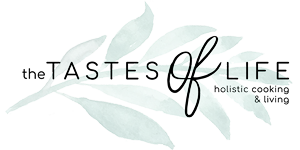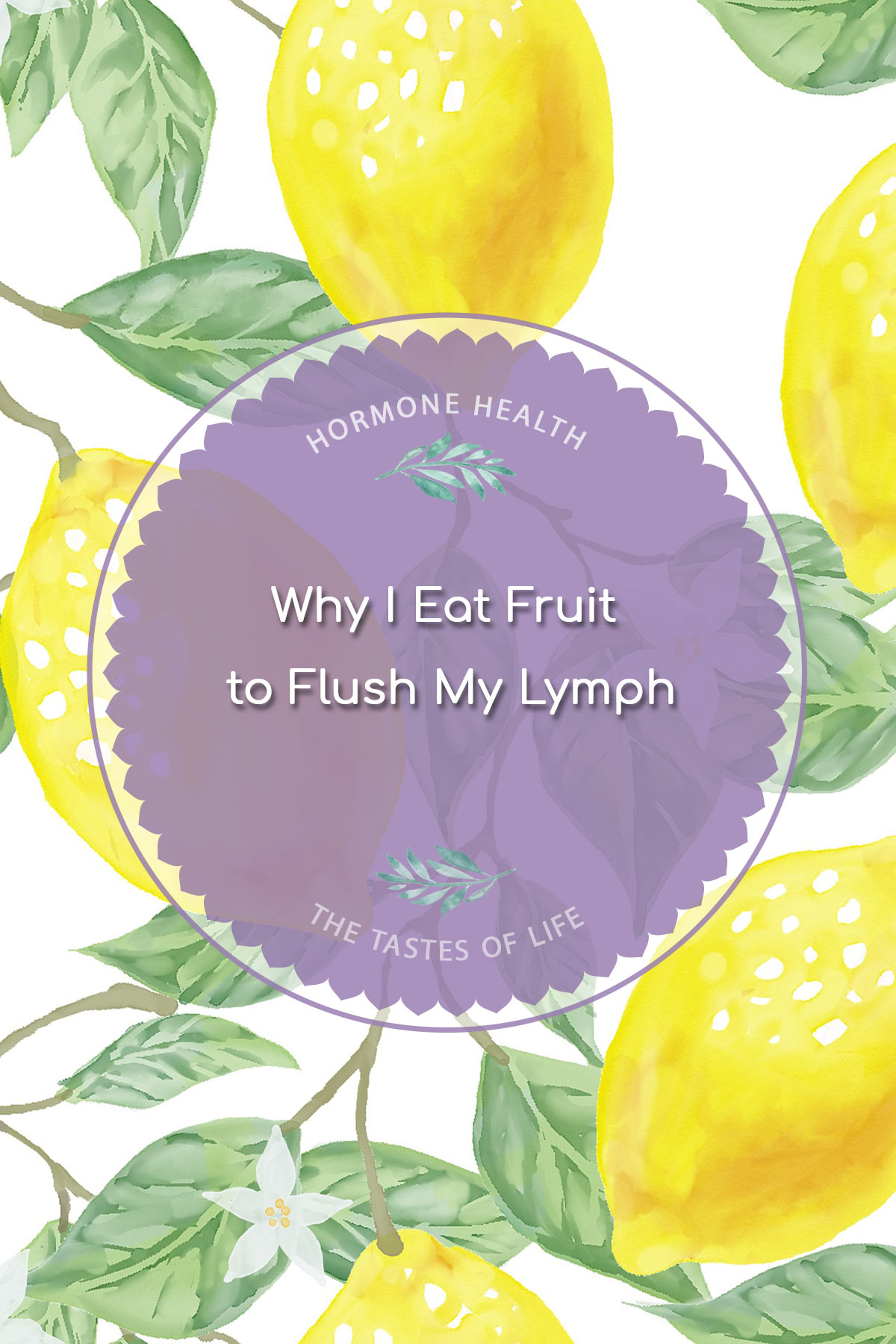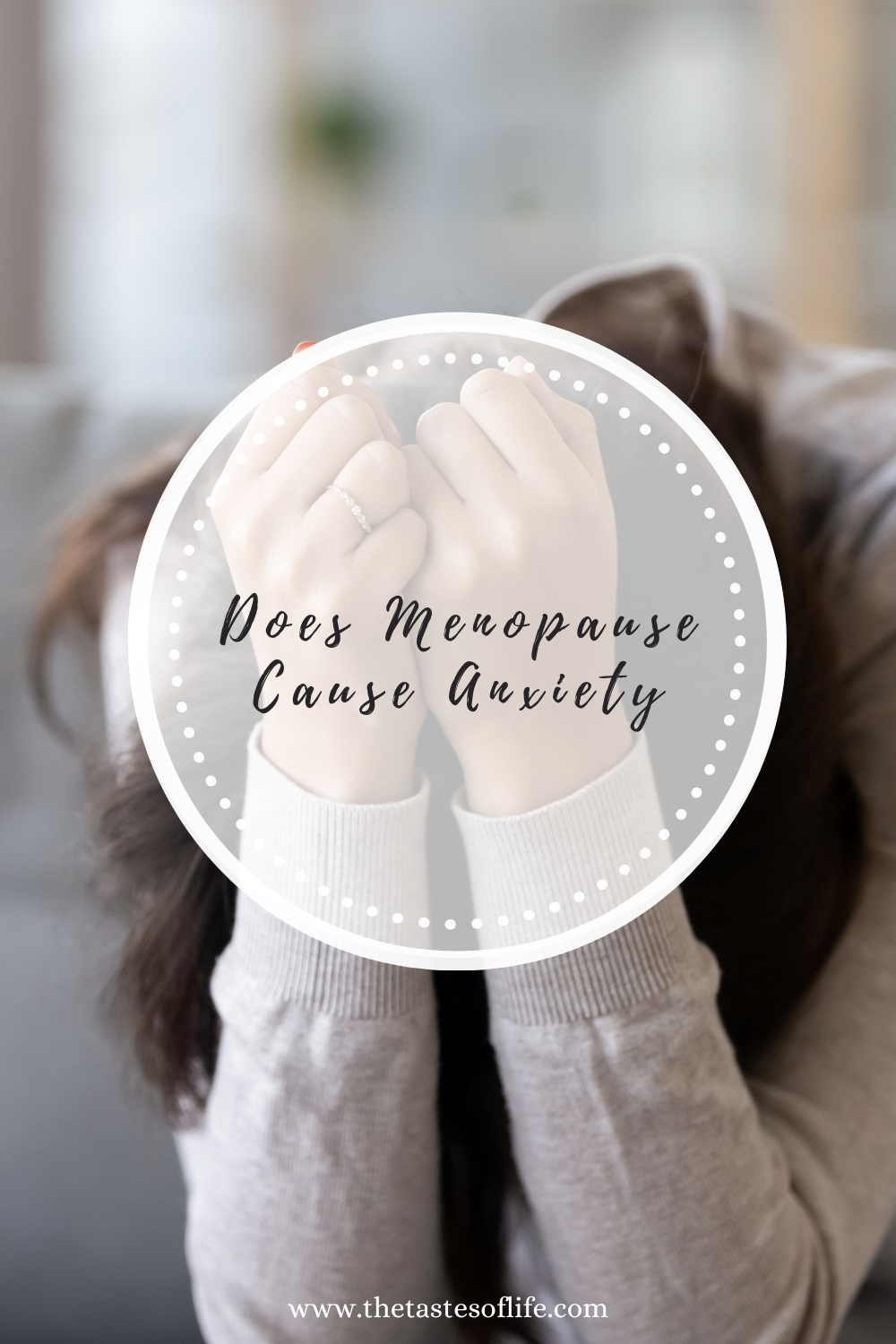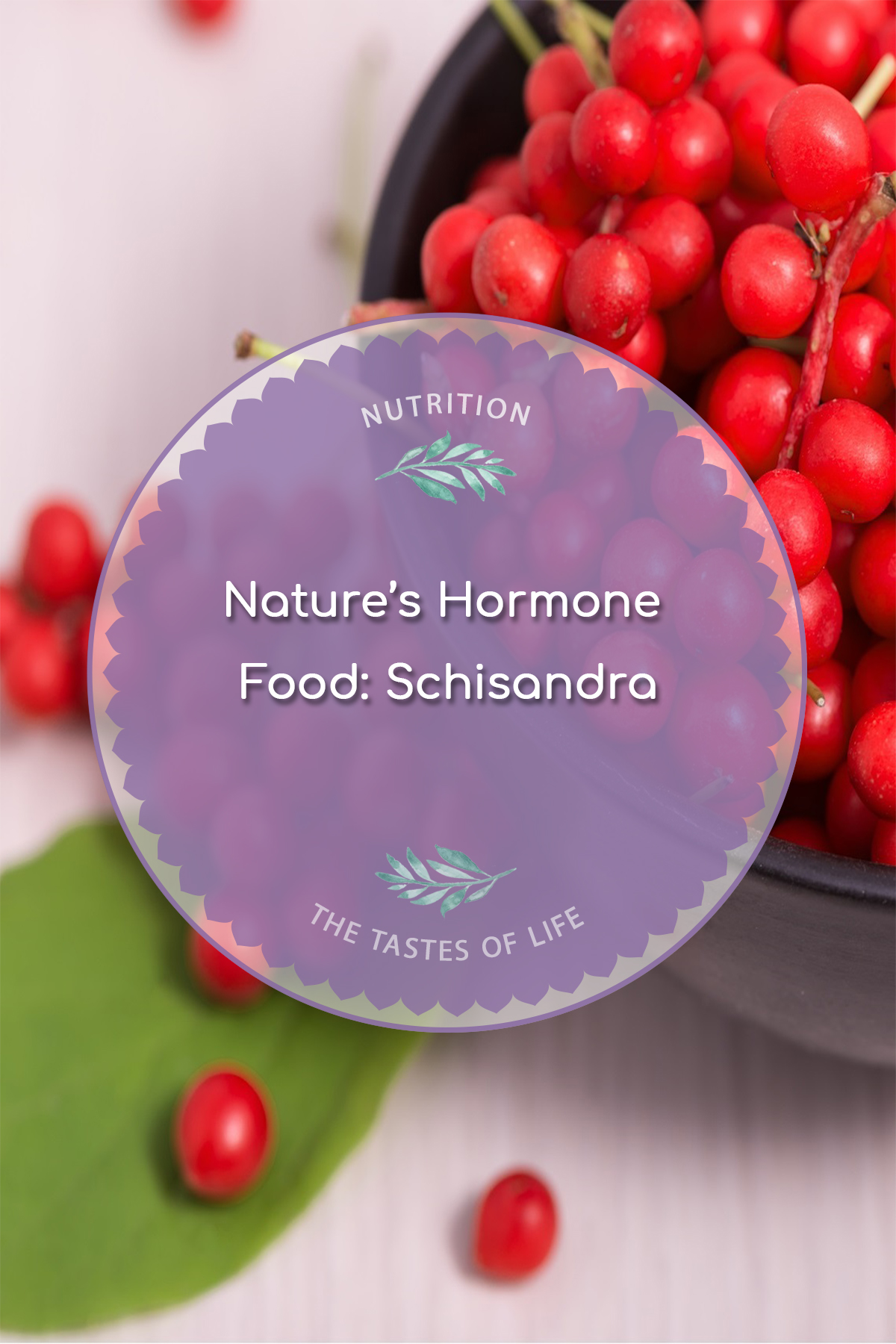Hot Flashes: Causes and Natural Relief Strategies
Discover why hot flashes are often more intense at night during menopause. Explore the hormonal changes that disrupt sleep patterns, and learn effective natural strategies to alleviate nighttime discomfort and improve sleep quality.
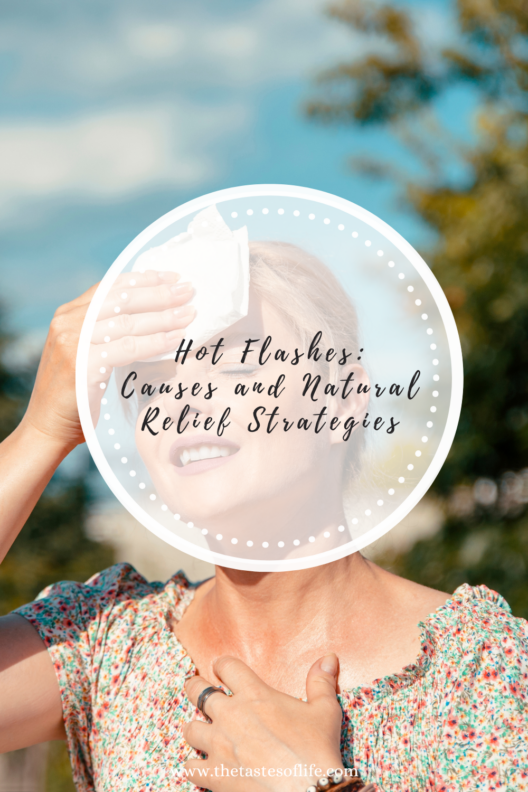
Natural Relief Strategies for Hot Flashes
Menopause is a natural phase in every woman’s life, marking the end of menstruation and reproductive years. While it’s a normal transition, it can come with various symptoms that differ from woman to woman. One of them is hot flashes. We will talk in this blog about hot flashes: causes and natural relief startegies.
Hot flashes are one of the most common and bothersome symptoms experienced during menopause, affecting around 75% of women. Characterized by sudden feelings of intense heat, sweating, and flushing, hot flashes can disrupt daily activities and negatively impact quality of life. Some women can even experience severe hot flashes, and some experience mild versions.
While they’re a natural part of the menopausal transition, there are several strategies, both natural and lifestyle-based, that can help alleviate their frequency and intensity. We’ll delve into the causes of hot flashes and explore effective ways to find relief.
Understanding Hot Flashes:
Hot flashes occur due to hormonal fluctuations, particularly a decline in estrogen levels, which disrupt the body’s temperature regulation mechanisms.
Hot flashes, also known as vasomotor flushes, are characterized by flushing and sweating, especially around the neck and head, and a sudden feeling of body heat. Night sweats are unmistakable. Your pulse will speed up, you can feel pressure in your head, and your skin, neck, head, and chest will feel warm as your blood rushes to the surface. They can last anywhere from 2-5 minutes, dissipate, and then leave you feeling cold. Some can experience shortness of breath, vertigo, weakness, dizziness, headache, numbness, insomnia, irritability, itchy skin, and a racing heart.
The intensity and frequency of hot flashes vary considerably. Some women can experience only one hot flash daily; others can have numerous flashes throughout the day. The natural decrease in progesterone and estrogen causes the specific reason for hot flashes.
Hot flashes are the first symptoms of menopause and begin while women still have their moon. During the first two years of menopause, the flashes tend to be the most uncomfortable. Some women might experience severe hot flashes They eventually decrease as the body adapts to lower estrogen levels.
Here’s a closer look at why hot flashes happen:
- Hormonal Changes: Estrogen plays a crucial role in regulating body temperature by affecting the hypothalamus, the body’s internal thermostat. During menopause, estrogen levels decline as the ovaries produce fewer hormones. This decline in estrogen can disrupt the hypothalamus’ ability to regulate body temperature effectively, leading to sudden and intense heat sensations.
- Hypothalamic Dysfunction: The hypothalamus, located in the brain, regulates various bodily functions, including temperature control. It contains receptors sensitive to changes in hormone levels, particularly estrogen. Fluctuations in estrogen levels during menopause can disrupt the functioning of these receptors, leading to abnormal responses in the body’s temperature regulation system.
- Neurotransmitter Imbalance: Changes in estrogen levels, such as serotonin and norepinephrine, which play a role in regulating body temperature, can also affect neurotransmitters in the brain.
- Blood Vessel Dilation: Hot flashes involve a sudden dilation (widening) of blood vessels near the skin’s surface, which allows more blood to flow through and dissipate heat. This dilation results in a sudden rush of warmth and flushing of the skin, often accompanied by sweating.
- Hot Flash triggers Triggers: Various factors can trigger or exacerbate hot flashes, including stress, spicy foods, alcohol, caffeine, hot beverages, hot weather, tight clothing, and certain medications. These triggers can activate the body’s temperature regulation system, leading to the onset of hot flashes.
While hot flashes are most commonly associated with menopause, they can also occur during perimenopause (the transitional phase leading up to menopause), as well as in women undergoing certain medical treatments such as chemotherapy or surgical menopause (removal of the ovaries).
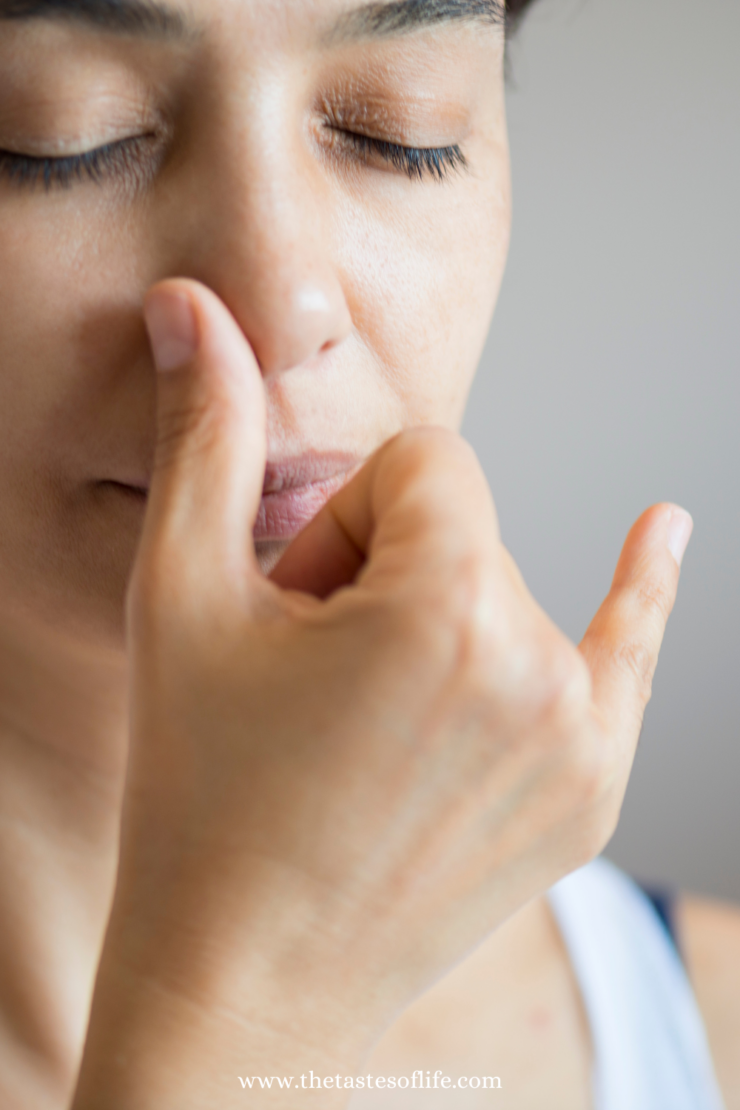
Natural Remedies – Lifestyle Changes
Natural relief strategies for hot flashes include:
- Dress in Layers: Wearing lightweight, breathable fabrics and dressing in layers allows you to adjust your clothing quickly when a hot flash occurs. Opt for natural fibers like cotton or linen, which are more breathable and can help wick away moisture from the skin.
- Stay Cool: Keep your living environment cool by using fans, opening windows, or using air conditioning, especially during warmer months. Use cooling products such as gel packs, cooling towels, or handheld fans to help lower your body temperature during a hot flash.
- Mindful Breathing: Deep breathing exercises can help reduce hot flashes’ intensity and duration. Practice mindful breathing exercises such as diaphragmatic breathing or yoga pranayama to promote relaxation and regulate your body’s response to temperature changes.
- Stay Hydrated: Drinking cold water or other non-alcoholic, non-caffeinated beverages can help lower your body temperature and reduce the severity of hot flashes. Aim to stay hydrated throughout the day, especially during periods of increased physical activity or in hot environments.
- Herbal Remedies: Certain herbal supplements have been found to provide relief from hot flashes for some women.
- Acupuncture and Acupressure: Traditional Chinese practices like acupuncture and acupressure have shown promise in reducing the frequency and severity of hot flashes.
- Prevent weight gain: Excess weight can exacerbate hot flashes, so maintaining a healthy weight through regular exercise and a balanced diet may help reduce their frequency and intensity. Aim for a combination of cardiovascular exercise, strength training, and flexibility exercises to support overall health and well-being.
- Manage Stress: Stress can trigger or exacerbate hot flashes, so incorporating stress-reducing practices such as meditation, yoga, tai chi, or progressive muscle relaxation techniques into your daily routine can help alleviate symptoms.

Botanicals – Herbal Remedies For Reducing Hot Flashes
Black Cohosh (Cimicifuga racemosa):
- Black cohosh is one of the most researched herbs for menopausal symptoms, including hot flashes. It is believed to have estrogen-like effects, although the exact mechanism of action is not fully understood.
- Studies have shown mixed results regarding its effectiveness in reducing hot flashes, with some women experiencing significant relief while others see little to no improvement.
- Black cohosh is available in various forms, including capsules, tablets, tinctures, and teas.
Red Clover (Trifolium pratense):
- Red clover contains isoflavones, plant compounds with estrogen-like effects. These isoflavones may help alleviate menopausal symptoms, including hot flashes.
- While some studies have shown promising results in reducing the frequency and severity of hot flashes with red clover supplementation, more research is needed to confirm its efficacy.
- Red clover is commonly consumed as a tea or in supplement form.
Dong Quai (Angelica sinensis):
- Dong quai is a traditional Chinese herb often used for women’s health issues, including menopausal symptoms.
- While it’s commonly touted as a remedy for hot flashes, scientific evidence supporting its effectiveness is limited. Some studies suggest it may have mild estrogenic effects, which could potentially help alleviate hot flashes.
- Dong quai is available in various forms, including capsules, tablets, tinctures, and teas.
Evening Primrose Oil (Oenothera biennis):
- Evening primrose oil contains gamma-linolenic acid (GLA), an omega-6 fatty acid with anti-inflammatory properties. Some women use it to manage menopausal symptoms, including hot flashes.
- While research on its efficacy for hot flashes is limited and mixed, some women report finding relief with evening primrose oil supplementation.
- Evening primrose oil is typically taken in capsule form.
Soy Foods – Soy Isoflavones:
- Soybeans and soy products contain isoflavones, plant compounds with estrogen-like effects. Some studies suggest that soy isoflavones may help reduce the frequency and severity of hot flashes.
- Foods rich in soy isoflavones include tempeh and tofu. Just make sure you buy organic and dont drink soy milk. Soy isoflavone supplements are also available.

Drink Cooling Herbal Teas With
- Mint
- Sage
- Motherwort
- Nettles
- Fenugreek
- Oat straw
- Red clover
- Passionflower
- Chamomile
- Linden flower
Sage will help with hot flashes at night. Before bed, drink a cup of sage tea. Motherwort will help you relax and calm heart palpitations associated with hot flashes. Passionflower is excellent for insomnia, which can happen with menopause. Herbal infusions such as nettles, oat straw, and red clover replenish minerals like potassium, magnesium, and vitamin C. They will nourish the adrenals.
To help with liver detoxification, drink teas with dandelion and yellow dock.
Just remember herbal supplements can interact with medications and may not be suitable for everyone, especially those with certain medical conditions or hormone-sensitive conditions like breast cancer. Talk to your health care provider.
Nutrition for Prevent Hot Flashes
- Balance your blood sugar
- Eat clean food
- Reduce sugar from your menu
- Avoid white flour
- Reduce caffeine
- Reduce alcohol
- No spicy food
- Eat food rich in phytoestrogens (flax seeds, sesame seeds, fenugreek, and soy). If you want to eat soy, ensure it is organic and fermented (ex., tempeh and soy sauce).
Phytoestrogens are naturally occurring estrogens contained in plants. They have isoflavonoids, which are chemically compared to estrogen found in the human body. They reduce and modulate menopausal symptoms.
- Add citrus bioflavonoids to your menu (ex., tangerines, oranges, grapefruit)
- Vitamin E: prevents vaginal tissue from becoming dry and prevents heart disease
- Vitamin C: it helps strengthen adrenal function, which is paramount because, after menopause, it takes over the production of hormones.

Aromatherapy
Aromatherapy is excellent for releasing tension and relieving the discomfort of hot flashes. An excellent way to use aromatherapy is by taking relaxing baths and using diffusers.
Make sure you avoid hot baths because they will raise your temperature. Use lukewarm water with frankincense, clary sage, geranium, rose, and lavender oil. These baths will help balance your hormones.
You can also use some drops of these oils with carrier oil and massage near your ovaries.
You can enjoy a cooling facial mist by carrying a spray bottle filled with water and essential oils such as peppermint or geranium.
Inhaling diffusions of thyme or basil oil can be nice as well!
Exercise
Exercise reduces hot flashes by decreasing the amount of circulation of LH and FSH. It tones and nourishes the hypothalamus and raises endorphin levels (which are dropped by hot flashes)
Homeopathic remedies
Try out homeopathic remedies that significantly reduce hot flashes, such as Lachesis.
Natural progesterone
Natural progesterone can reduce hot flashes in some women. You can purchase progesterone cream at a health food store. Make sure to research it and follow the package’s instructions.
Bioidentical Hormone Replacement Therapy
Find a practitioner who specializes in this therapy. Estrogen therapy can be used to reduce hot flashes.
Hot flashes are a common and often challenging symptom experienced during menopause, but they don’t have to control your life. By implementing natural relief strategies such as dressing in layers, staying cool, practicing mindful breathing, staying hydrated, exploring herbal remedies, and managing stress, you can effectively reduce the frequency and intensity of hot flashes and improve your overall quality of life during this transitional phase. It’s essential to listen to your body, experiment with different strategies, and seek support from healthcare professionals or support groups if needed to find the right combination of techniques that work best for you.
Herbal Teas:
References:
https://pubmed.ncbi.nlm.nih.gov/30335320/
- Geller SE, Studee L. Botanical and dietary supplements for menopausal symptoms: what works, what doesn’t. J Womens Health (Larchmt). 2005 Mar;14(2):116-23. doi: 10.1089/jwh.2005.14.116. PMID: 15775778.
- Newton KM, Reed SD, LaCroix AZ, Grothaus LC, Ehrlich K, Guiltinan J. Treatment of vasomotor symptoms of menopause with black cohosh, multibotanicals, soy, hormone therapy, or placebo: a randomized trial. Ann Intern Med. 2006 Dec 19;145(12):869-79. doi: 10.7326/0003-4819-145-12-200612190-00172. PMID: 17179056.
- Lethaby AE, Brown J, Marjoribanks J, Kronenberg F, Roberts H, Eden J. Phytoestrogens for vasomotor menopausal symptoms. Cochrane Database Syst Rev. 2007 Oct 17;(4):CD001395. doi: 10.1002/14651858.CD001395.pub3. PMID: 17943778; PMCID: PMC7054221.
- Taku K, Melby MK, Kronenberg F, Kurzer MS, Messina M. Extracted or synthesized soybean isoflavones reduce menopausal hot flash frequency and severity: systematic review and meta-analysis of randomized controlled trials. Menopause. 2012 Feb;19(7):776-90. doi: 10.1097/gme.0b013e3182410159. PMID: 22367731; PMCID: PMC3660258.
- Chen MN, Lin CC, Liu CF. Efficacy of phytoestrogens for menopausal symptoms: a meta-analysis and systematic review. Climacteric. 2015;18(2):260-9. doi: 10.3109/13697137.2014.966241. Epub 2014 Oct 3. PMID: 25277715.
- Ghazanfarpour M, Sadeghi R, Abdolahian S, Latifnejad Roudsari R, Khadivzadeh T, Khorsand I, Afiat M, Karimian Z, Agarwal A. Efficacy of red clover in alleviating menopausal symptoms: a 12-week randomized, controlled trial. Climacteric. 2016 Oct;19(5):478-484. doi: 10.1080/13697137.2016.1224610. Epub 2016 Aug 29. PMID: 27573968.
- Leach MJ, Moore V. Black cohosh (Cimicifuga spp.) for menopausal symptoms. Cochrane Database Syst Rev. 2012 Sep 12;(9):CD007244. doi: 10.1002/14651858.CD007244.pub2. PMID: 22972105
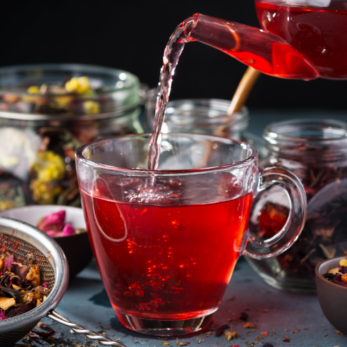
Ingredients
- 2 tbsp Fenegurek seeds
- 2 tbsp Sage Dried
- 2 tbsp Motherowrt
- 1 tbsp Nettles
- Mint leaves Fresh
Instructions
- Put the herbs in a mason jar.Pour hot water over herbs, cover the jar with a smal aplateand let it steep for 15 minutes. Strain and drink.
